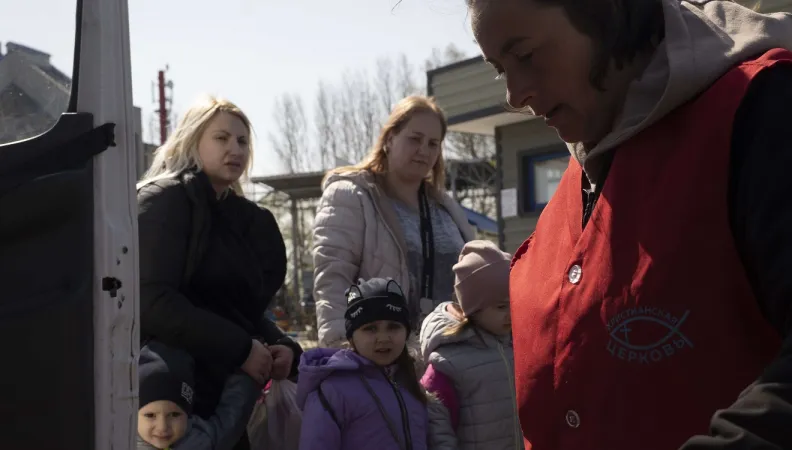Share the page
“We’re taking the Long-Term View of Ukraine and the Region”
Published on

As the war between Russia and Ukraine enters its second year, our specialist examines the impact of the conflict in Eurasia and explains how AFD is responding.
One year on from Russia’s invasion of Ukraine, what are the repercussions for countries in Eurasia?
There are repercussions of varying kinds. First, these countries are clearly facing security issues as a result of the attack on Ukraine, a violation of international law that took place even after the first annexation of Crimea. Consequently, the countries in this region have begun reviewing ways to ensure their own security. Military capability is not the only factor; issues such as energy security are also concerned. As the war in Ukraine drags on, it is affecting energy prices.
There are also economic repercussions, such as increased prices for raw materials, disruption to supply chains, the rising costs to transport goods, and the collapse of tourism. This crisis is affecting not only Eurasian countries; it’s causing shockwaves around the world.
How is AFD supporting Ukraine and its neighboring countries?
We are working both on a short-term basis –because of the urgency of the situation – and on a long-term strategy. At the start of the conflict, we appraised a €300 million loan to Ukraine within three weeks, at the French government’s request. We had not been present in Ukraine until that point, but we could not remain indifferent. This demonstrates how quickly AFD can respond when required.
In Moldova, which has seen a massive influx of Ukrainian refugees, AFD provided support to three NGOs in collaboration with the Fondation de France, which oversaw these operations, releasing €200 million in financing. As a result, refugee families were provided with care and psychosocial support, to help them integrate into the Moldovan school system and find work. As we are not involved in the humanitarian emergency response, AFD is working to help people recover from the crisis and stabilize the situation. Therefore, we have also been supporting microfinance institutions to ensure that the economy continues to function as far as possible.
See also: Ukrainian War Worsens African Food Crisis
In 2021, we opened an office in Moldova, which is highly dependent on Russia for energy. However, the country has launched a rapprochement process with the European Union, supported by AFD to develop a regulatory framework geared towards promoting renewable energies and energy efficiency, while reducing its energy dependence. AFD’s Chief Executive Officer had the opportunity to discuss this issue with President Sandu. Across the Balkans region, we aim to develop joint solutions to common problems, whether involving emergencies associated with the war in Ukraine or longer-term challenges.
On the other side of the Black Sea, in the Caucasus region, AFD is working with the authorities in Georgia to strengthen social protection measures and implement energy and agriculture projects. Today, the situation in Georgia is even more complex because of its direct contact with Russia. The simple fact that France has a presence there through AFD sends a very important message.
The war is also having an impact further east, in Uzbekistan for example, where the geopolitical repercussions of this crisis are concentrated. The country used to export a lot of goods by land through south Russia and Ukraine. These routes are now closed and there are no easy alternatives. However, in other areas, the Uzbek response has been exemplary, with the country accelerating its energy transition and setting up social safety nets supported by AFD.
How will this support evolve in 2023?
We must keep a certain distance, as the issues with which we are involved are complex. For example, the energy transition in Moldova is undoubtedly going to take time. Energy is an absolutely fundamental issue on which we must continue to work collectively in Europe. This European solidarity needs to be demonstrated in the field, because it works!
In Ukraine, AFD is continuing its work on governance through Expertise France. The closer we get to a time when the possibility of reconstruction can be discussed, the more important good governance will become in building trust among partners. Expertise France’s work is therefore key for AFD in Ukraine. And if the French government asks AFD to serve in its development bank role, we will be ready.
Lastly, the agenda should be highlighted for the Western Balkans: Serbia, Bosnia-Herzegovina, Kosovo, Montenegro, Albania and Northern Macedonia. AFD has been investing in these countries for three years and is set to reach €1 billion in project financing. There are multiple needs in the region, including water, sanitation, and the just energy transition, and our support is anticipated there.
In addition, AFD’s work in this region – the first of its kind – has given France a new status in Eurasia. Whether in the Balkans or the Caucasus, AFD is taking a long-term approach by choosing its areas of intervention with care. The European political community, backed by the President of the Republic, has defined a continent-wide vision for our operations from this point forward.
